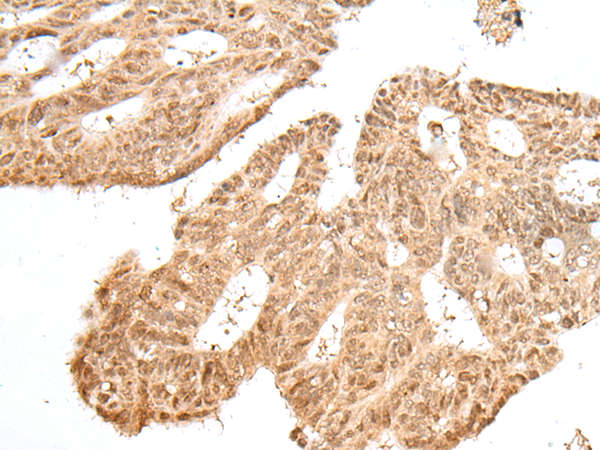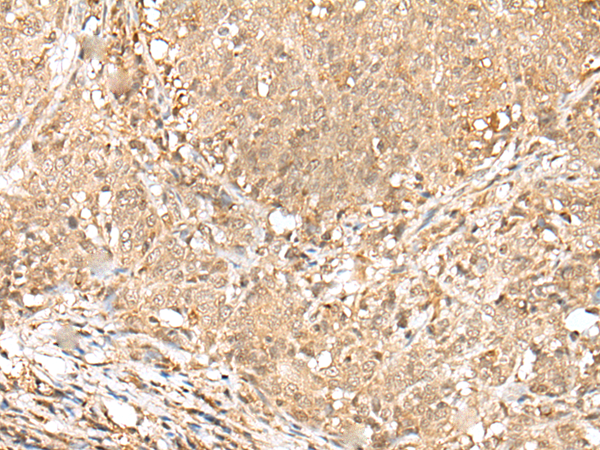

| WB | 咨询技术 | Human,Mouse,Rat |
| IF | 咨询技术 | Human,Mouse,Rat |
| IHC | 1/25-1/100 | Human,Mouse,Rat |
| ICC | 技术咨询 | Human,Mouse,Rat |
| FCM | 咨询技术 | Human,Mouse,Rat |
| Elisa | 1/5000-1/10000 | Human,Mouse,Rat |
| Aliases | AP-1 |
| Host/Isotype | Rabbit IgG |
| Antibody Type | Primary antibody |
| Storage | Store at 4°C short term. Aliquot and store at -20°C long term. Avoid freeze/thaw cycles. |
| Species Reactivity | Human, Mouse, Rat |
| Immunogen | Synthetic peptide of human JUNB |
| Formulation | Purified antibody in PBS with 0.05% sodium azide and 50% glycerol. |
+ +
以下是关于JUNB抗体的3篇参考文献及其简要摘要:
1. **"JUNB governs a feed-forward network of TGFβ signaling that reinforces chemoresistance"**
- **作者**: Zhao, M. et al. (2018)
- **摘要**: 该研究揭示了JUNB通过调控TGFβ信号通路促进肿瘤细胞对化疗药物的抵抗,利用JUNB抗体验证了其在乳腺癌模型中的表达及功能机制。
2. **"The AP-1 transcription factor JUNB promotes autoimmunity by driving IL-23/Th17 responses"**
- **作者**: Ortner, D. et al. (2020)
- **摘要**: 通过JUNB抗体检测发现,JUNB在自身免疫疾病中驱动IL-23依赖的Th17细胞分化,揭示了其在炎症反应中的关键调控作用。
3. **"JUNB deficiency perturbs adult hematopoietic stem cells homeostasis"**
- **作者**: Passegué, E. et al. (2004)
- **摘要**: 研究利用JUNB抗体分析造血干细胞,发现JUNB缺失导致干细胞稳态失衡和骨髓异常增殖,强调了其在造血系统中的重要性。
4. **"A c-Jun/JunB heterodimer regulates the balance between retinal progenitor cell self-renewal and differentiation"**
- **作者**: Joo, H.J. et al. (2019)
- **摘要**: 通过JUNB抗体实验,证明JUNB与c-Jun形成异源二聚体调控视网膜祖细胞自我更新与分化的平衡,影响眼部发育过程。
以上研究均通过JUNB抗体进行蛋白定位或功能验证,涵盖肿瘤、免疫、干细胞及发育生物学领域。
JUNB antibody is a research tool used to detect and study the JUNB protein, a member of the AP-1 (Activator Protein 1) transcription factor family. JUNB, along with other AP-1 components like c-JUN and FOS proteins, forms dimeric complexes that regulate gene expression by binding to specific DNA sequences. It plays critical roles in cellular processes, including proliferation, differentiation, apoptosis, and immune responses. Dysregulation of JUNB has been linked to cancers (e.g., lymphoma, breast cancer), inflammatory diseases, and autoimmune disorders.
The JUNB antibody is essential for identifying JUNB expression levels, subcellular localization, and interactions in techniques such as Western blotting, immunohistochemistry (IHC), immunofluorescence (IF), and chromatin immunoprecipitation (ChIP). It helps researchers explore JUNB's functional mechanisms, such as its dual role in tumorigenesis—acting as both an oncogene and tumor suppressor depending on context. For example, JUNB overexpression is associated with cutaneous T-cell lymphoma, while its loss may promote genomic instability.
Commercial JUNB antibodies are typically raised in hosts like rabbits or mice, targeting specific epitopes of human, mouse, or rat JUNB. Validation includes testing for specificity via knockout controls or siRNA knockdown. Researchers rely on these antibodies to investigate JUNB's involvement in signaling pathways (e.g., TGF-β, MAPK) and its regulatory effects on cytokines and cell cycle proteins, advancing therapeutic discoveries in oncology and immunology.
×